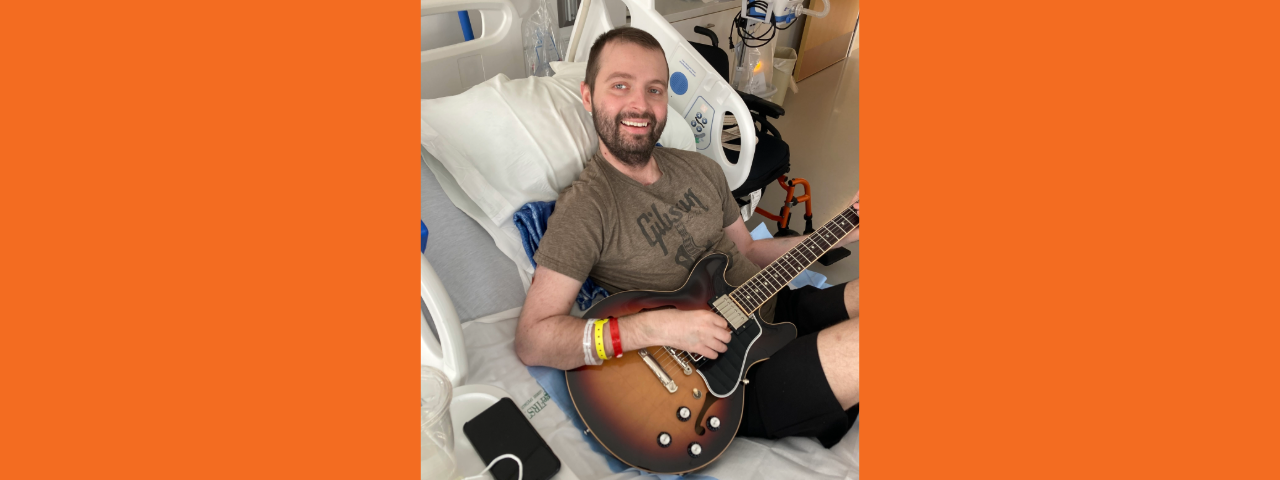Body
The odds of making it as a professional comedian are a thousand to one . . . but the odds don’t factor in Tim Cavanagh.
Not only has Tim, age 69, been a successful comedian for more than four decades, he’s also beaten long odds several times in just the last year and a half — fighting Stage II pancreatic cancer, soldiering through eight rounds of chemotherapy and 25 rounds of radiation therapy, undergoing and recovering from a 12-hour, two-surgeon procedure and surviving post-surgical respiratory complications so severe that he needed a ventilator at one point.
Tim’s respiratory complications put him in the ICU, where he lay flat on his back for 25 days. The long stretch of immobility, combined with compromised breathing, significantly impaired his physical and cognitive functioning. Remarkably, Tim scaled most of these mountains before he started nearly a month of intense inpatient rehabilitation therapy at Shirley Ryan AbilityLab.
Tackling Cachexia Through Cancer Rehabilitation
Body
“When I arrived, I couldn’t stand or walk,” said Tim. “I was so weak; I had lost 40 pounds due to cachexia, cancer-related muscle loss. Some of my core muscles had been cut and reconnected during surgery, and all of my muscles had atrophied. Even more concerning, at some point, the respiratory complications caused a decline in the flow of oxygen to my brain. Thinking and remembering were so frustrating. I had trouble recalling the date and year.”
As a Shirley Ryan AbilityLab inpatient, Tim received intensive physical, speech and occupational therapy through our Cancer Rehabilitation Innovation Center. “I rarely saw my room,” he said. “It was obvious and reassuring to me that my therapists were so experienced and highly trained. I trusted them to know what to do, so my job was to do what I was told. I did. There were no snow days.”
Therapy included a lot of time on the treadmill, upper-body strength exercises, practice going from the sitting to standing position, and walking up and down stairs.
Tim said climbing stairs was particularly daunting. “I have stairs at home, so being able to climb up and down stairs was nonnegotiable. My therapists always pushed me, but when I got frustrated or tired, they were so compassionate and encouraging. They were completely dedicated to my progress, and to me. Because of the bond we formed, I knew I was in a safe place, in the best hands, and it would be all right.”
Luckily, with the help of cognitive exercises, Tim’s memory, executive functioning and comprehension skills came back quickly. Eight days into his stay, his wife, Chris, brought a guitar and asked him to sing a song from his act. He got through it without missing a beat. With tears in her eyes, she said, “You’re back!"
“At that moment, in room 2418, just 32 days after pancreatic cancer surgery, we felt like we were on top of the world,” said Tim.
Laughter and Therapy Restore Physical and Cognitive Functioning
Body
Tim’s medical team was humbled by his intrepid spirit, and really enjoyed his sense of humor and frequent self-described goofiness. “Laughter really is the best medicine. The endorphins release, sure, but you just feel better, happier.”
After three weeks of inpatient therapy, Tim was ready to go home. To thank his team, he once again tapped his creative muse. He wrote and performed a song just for them full of inside jokes, rehabilitation humor, gratitude and love.
Once home, Tim continued therapy as an outpatient for eight weeks at Shirley Ryan AbilityLab’s Burr Ridge location. There, he continued working on his strength and endurance 2-3 times a week — and prepared to hit the comedy circuit once again.
Returning to the Life He Loves
Body
A mere four months after surgery, a cancer-free Tim returned to the stage. He says it was a testament to the quality of and approach to rehabilitation that he experienced at Shirley Ryan AbilityLab.
Following a recent performance in front of a 150-person crowd, Tim got very positive feedback, praising him especially for being quick on his feet.
“The ‘quick on your feet’ comment is a tribute to your team that worked with me to get my cognitive skills back to pre-surgery levels,” said Tim.
Today, Tim calls himself a lucky man. “I’m so lucky, in love and life,” said Tim. “I’ve been married for 45 years; I’ve gotten to pursue my dream career and make a living at it. I also realize now that I got ‘lucky’ because I had symptoms early on, enabling a faster diagnosis. I also got lucky that I could be admitted to this amazing place of healing.”
His advice to other patients? “Do what they tell you to do. Have patience. Be gentle with yourself when you get frustrated and know that you’re not alone."

